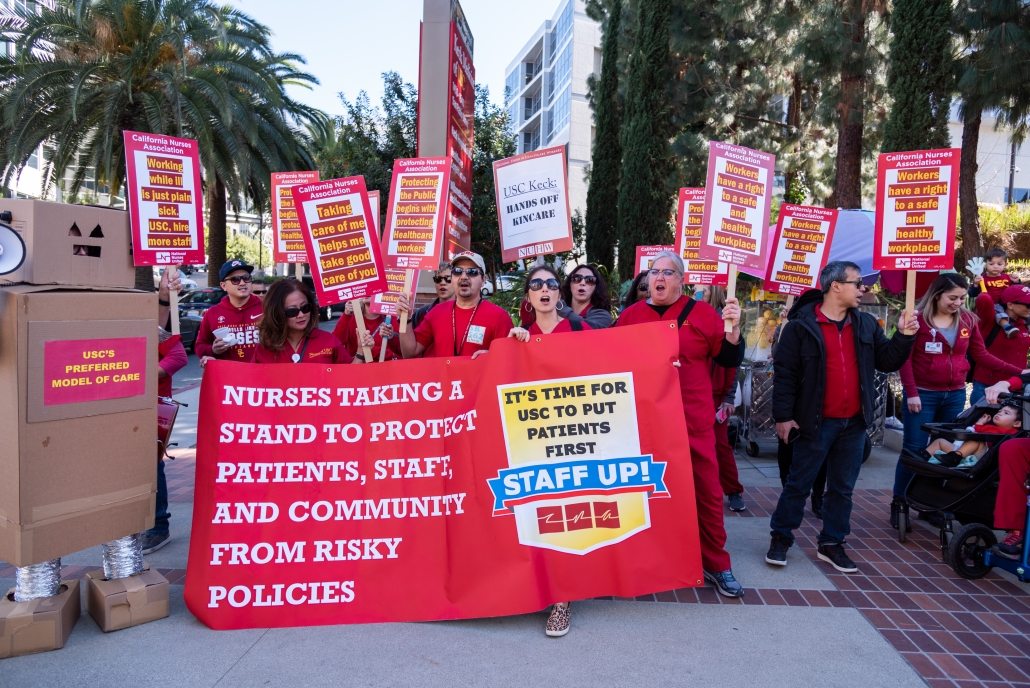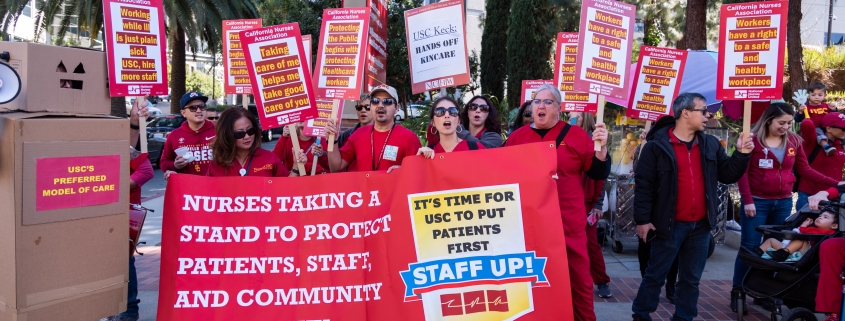Keck workers protest leave policy

Health care workers protested a Keck Medicine of USC policy change Tuesday that the workers said would negatively impact the quality of care they provide. The policy will reduce sick leave allowances, causing protesters to worry that it could lead employees to arrive to work sick and pose a health risk to patients, especially those with immune system deficiencies.
Marching up and down San Pablo and Norfolk streets, more than 50 workers chanted “USC, you can’t hide” and “Hands off my PTO,” referring to their paid time off.
Under the new policy that will take effect Feb. 16, Keck workers can take up to 96 hours of sick leave per year, including hours used from paid time off. The current policy does not limit the amount of paid time off that can be used for short-term illness, according to flyers demonstrators handed out at the picket line. The change also states that an unexcused absence from work without advanced notice will result in a final warning before termination. Disciplinary action is currently taken after an employee accrues six unexcused absences. Protesters said the new policy compromises their ability to care for dependents when they fall ill.
“We’re picketing because it’s not only affecting us as workers, it’s also affecting the family that we raise, from our children to our elderly parents,” said Bernadette Ramos, a registered nurse who attended the protest. “We have to fight for this because we don’t want to call in sick, but we have to have that guarantee that when we need it, it will be there for us.”
Keck Medicine said in a statement that its new policy complies with local, state and federal law, and it will continue to honor protected leaves of absence as stipulated by labor laws. Los Angeles requires a minimum of 48 hours of paid sick leave, and USC provides 96 hours to all its employees, which can be used for personal sick days or time off to care for ill relatives.

The protesters, which included medical assistants and technicians, respiratory therapists and registered nurses, said the change would cause more hospital employees to come to work sick and potentially transmit diseases to their patients.
“You don’t want to come in sick and then have our patients, who are susceptible to all kinds of illnesses, be exposed to us as well,” Ramos said. “We like our job. We like being nurses. But if they don’t let us go have our rest time when we’re sick, then we will come sick. And who will that benefit? Nobody.”
Keck Medicine Chief Operations Officer Marty Sargeant said Keck Medicine adamantly discourages its employees from coming to work sick and provides workers with preventive resources to lower the risk of contagious disease.
“We take a big stance that the intention behind this policy is not to have people come to work sick,” Sargeant said. “We will ensure that that we do provide the proper protections and we do have the appropriate preventive means — the masks, the flu vaccine, etc. — to ensure we keep our employees healthy and keep our patients healthy as well.”
Shirley Calderon, a registered nurse at Keck Hospital, said if the policy issue is not resolved by allowing adequate hours for workers to take sick leave or care for their ill family members, she would consider looking for a job at another hospital.
“It’s not like I haven’t been offered other jobs,” said Calderon, who is currently pregnant. “If I’m here, it’s because I’ve been here for 10 years, and I do believe in taking care of our patients. This is one of the top hospitals, so I would expect them to have a little bit more consideration toward our staff and our patients.”
Keck Hospital continued normal operation during the picketing, Keck Medicine wrote in statementw. The department also said it respects the rights of the workers, who belonged to national health care workers’ and nurses’ unions, to demonstrate.

“Keck Medicine of USC updated its attendance and punctuality policy to ensure that the organization continues to provide the exceptional care our patients expect from us each and every day,” the statement read. “Our number one priority during this informational picket — and always — is to provide outstanding patient care.”
Doug Kauffman, a discharge planning coordinator in Keck’s social services division, said the new policy would force health care professionals to show up to work sick to avoid disciplinary action from the policy and believes that the protest will help inform workers of their rights.
“The point of the protest is really to mobilize all the workers at Keck and Norris [Cancer Center] who are going to be impacted by the policy and to let the community at large and patients know that the policies that the Keck administration is trying to put in place are going to be a threat to their own health,” Kauffman said.
The demonstrators carried signs that read “Standing up for our patients” and “Protecting the public begins with protecting health care workers” and set up an informational banner with statistics on Keck’s nursing staff deficits. USC nurses worked more than 43,000 hours of overtime and double-time, and the medical centers currently have a 92-nurse shortage, according to information presented by the protesters.
However, Sargeant said he could not confirm whether Keck is experiencing a shortage of nursing staff but that the medical centers ensure they meet staff-to-patient ratio guidelines and fill in the gaps with nurses from an agency Keck partners with.
“I can tell you that every day we look at our staffing, and we make sure we meet the appropriate ratios that are set forward by the state and ensure, more importantly, that we have the appropriate nursing care for the high acuity of our patients,” Sargeant said.
Ultimately, protestors want to reach an agreement with Keck administration using a shared governance model which has parties share the responsibility of creating policies that will affect the hospital staff.
“We want them to collaborate with us … to create a policy that’s safe for our patients and supports our staff,” said Keck registered nurse Tveen Kirkpatrick. “A policy that we both can stand by.”

